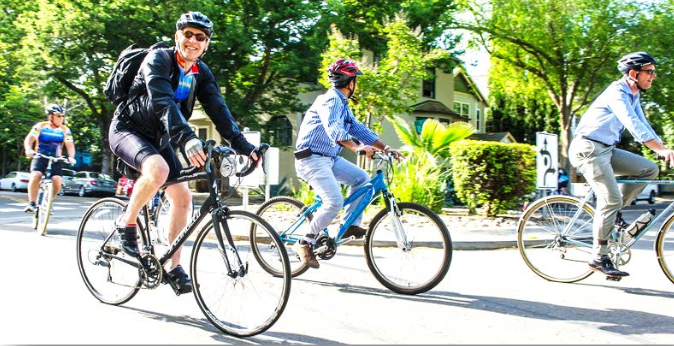Note: GJEL Accident Attorneys regularly sponsors coverage on Streetsblog San Francisco and Streetsblog California. Unless noted in the story, GJEL Accident Attorneys is not consulted for the content or editorial direction of the sponsored content.
Active Transportation in California: The Non-Motorized Transportation Facilities Report Fiscal Year 2016-17 highlights Caltrans' achievements of the past year in the realm of bicycle and pedestrian planning and design, as the department works towards its fast-approaching goals to increase the share of trips made by walking and bicycling in the state.
The top achievement in the report is the growing number of projects funded by the Active Transportation Program (ATP), which, as of December 2017, has funded over $1.1 billion in bicycle and pedestrian projects through fiscal year 2020-2021 since it was started in 2013.
“Caltrans is currently funding more than $300 million a year in non-motorized transportation projects,” says the report, including $225 million per year from the ATP itself. In addition, a new cycle of ATP funding should commence some time this spring.
Other Caltrans achievements touted in the report include:
- The first-ever Statewide Bicycle and Pedestrian Plan, “Toward an Active California.” As part of the statewide plan, Caltrans will fund individual Complete Streets plans for each of the twelve Caltrans districts. The goal of the local plans, according to the report, “is to increase bicycling, walking, and access to transit by preparing data-driven plans with quantifiable performance measures which will result in map-able data and project lists.”
- The creation and expansion of the Active Transportation Resource Center, which offers technical assistance and training on bicycle and pedestrian projects for designers, planners, and engineers, as well as serves as an information clearinghouse for safe streets design as well as Safe Routes to School traffic injury mapping systems, curriculums, and materials.
- Helping California move up on the League of American Bicyclists' statewide rankings, from 19th in 2013 to 8th in 2015—to third place in the nation last year. The LAB report card specifically called out the Bike and Pedestrian Plan, as well as the department's commitment to increasing active transportation's mode share, as evidence that California “seems to be getting serious about biking and walking.”
- The creation of a small employee bike-share system at Caltrans headquarters in Sacramento, which had been used by “more than 300 Caltrans employees... as part of their workday” as of April 2017, which also says the plan is to expand the program throughout the state.
- Caltrans Division of Research, Innovation, and System Information, “conducts more active transportation research than any other Department of Transportation in the country.” Current research topics include strategies for reducing pedestrian and bicyclist injury, managing pedestrian and car interactions, and the impact of bike-sharing on bicycle safety.
The report also highlights a number of specific “success stories” among projects that have received funding from the ATP. They include:
- A Safe Routes to Schools project in Paradise, CA that added sidewalks around several local schools and connected to a cross-town bike path
- SCAG's Go Human campaign in Imperial, Los Angeles, Orange, Riverside, San Bernardino, and Ventura counties, which aims to “tackle the region’s auto-centric reputation which discourages people from pursuing walking/bicycling in their communities, and increase awareness of community-wide benefits of walking and bicycling.”
- A Class I bike path connecting two existing paths in Truckee
- Sidewalks and ramps in Lompoc
- Green-painted bike lanes connecting students to a CSU campus in Sacramento
These projects, though small and relatively inexpensive, have the potential to make a huge difference in the way people move through the cities and towns they live in. The help create safe, connected routes for people who walk and bike, and they also send an important message that the safety of people who choose not to drive is just as important as that of people in cars.
Caltrans' Strategic Management Plan, which the department created in 2015, “represents a cultural shift toward mainstreaming bicycle and pedestrian modes into the state transportation system,” says the report. It includes performance targets for everyone at Caltrans to keep in mind when they design and build transportation facilities. These include: reducing fatalities for all road users; increasing the use of travel modes other than cars by 2020—specifically, tripling bicycle trips and doubling walking and transit trips; and increasing by 20 percent the number of complete streets projects in the state.
Yay, Caltrans. The department has come a long ways in the last few years towards encouraging active transportation modes. But to meet its stated goals, Caltrans will need to continue to up its game, ensuring that high-quality walk and bike facilities are indeed a key part of all the state's transportation projects.
Email tips, alerts, press releases, ideas, etc. to melanie@streetsblog.org.
For social media coverage focused on statewide issues, follow Melanie @currymel on Twitter or like our Facebook page here.






